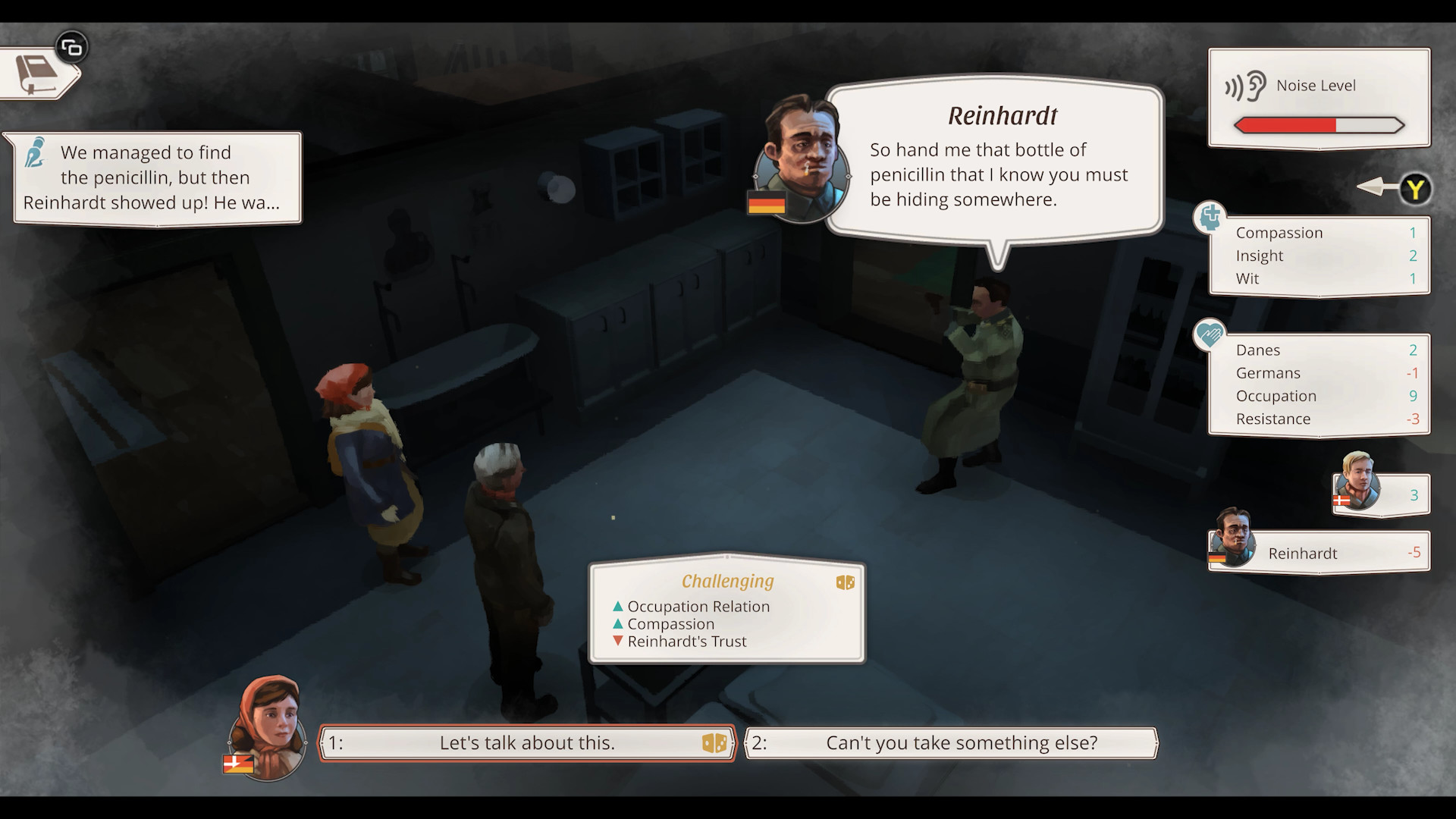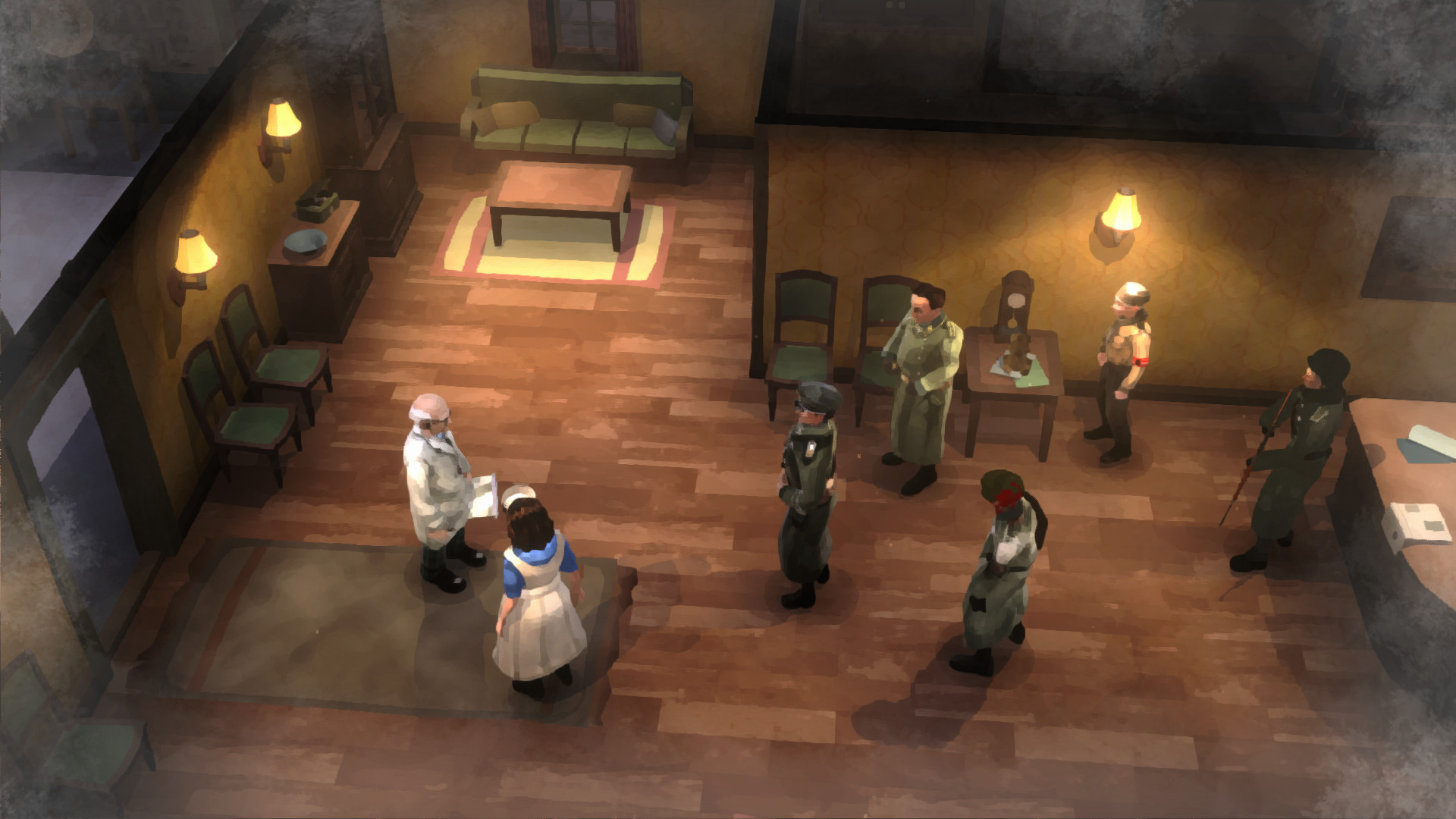Gerda: A Flame in Winter review
The story seen in Gerda: A Flame in Winter is a deeply personal one, not played out in the midst of warfare on the frontline, amongst crumbling buildings devastated by explosives or rumbling Tiger I’s destroying everything in their path. It takes place in the quiet Danish town of Tinglev where war has affected the every day lives of its residents, doing their best to make a living as the world around them has been thrown into disarray. It’s an intimate tale revolving around one woman’s fight to save her husband, no matter what it takes.
PortaPlay has constructed a wonderfully poignant narrative where every decision you make can impact Gerda, a nurse who lives within the conflict that has befallen the once quaint village she lives in. What makes her story more compelling is that she is half-German, half-Dane. It affects how those around her see and treat her, how all your decisions carry more weight than expected, and all the conflicting feelings that she feels for the duration of the game.
There were casualties on both sides of World War II. The Germans were always seen as the enemy, but what about the citizens who bore that nationality? The young children who had no idea who Hitler was or what he stood for? The families that wholly disagreed with the Nazi regime, but were tarred with the same brush? Take Gerda, for example. She didn’t choose her nationality or her family, so why should she be persecuted for her bloodline?

There is a lot of freedom in who you want Gerda to be and what decisions you make. Plenty of residents within Tinglev will interact with you, and relationships can be made and broken within a single conversation. I was often astounded by how these talks would unfold and what the repercussions would be the more I played. Some decisions I made earlier on had an impact further down the line, highlighting just how choice plays a vital role in Gerda: A Flame in Winter.
Every conversation revolves around how much trust an NPC has in you, and this is constantly won and lost depending on how you answer them. The more you get to know someone, the more rapport you might build, or the more you might grow to dislike them. Jacob, the village priest, became a close friend of mine, and I began to build a strong friendship with him. His trust in me grew, and it helped to get certain tasks done as the story progressed. Then there were people like Reinhardt, a German officer who I couldn’t help but be rude to, even though we had a love/hate relationship.
Nothing is clear cut in Gerda: A Flame in Winter. Some characters might rub you the wrong way or cause you to dislike them, but by being careful in how you respond to them might mean they’ll help in some way. Nobody is innocent, and everybody has a secret. You just need to be smart in how you play. Politics seep through everything, and making sure you use the three main skills wisely can be extremely profitable in your mission to save your husband from the Gestapo.
Compassion, Wit, and Insight act as your powers when manipulating conversations, aiding friends, or discouraging the enemy. Certain options will become available where you can use these three traits, and by doing so can help drastically. Other dialogue options require a chance roll, and the risks are often presented by a ‘hard,’ ‘challenging,’ or ‘easy’ option. These can be won by factors like how much trust others may have, or whether your relationship with one of the four factions (Germans, Danes, the Occupation, and the Resistance) is strong.

You will also acquire items from characters or certain locations you can use for bargaining chips. Some of the biggest decisions you make in Gerda: A Flame in Winter can all hinge on how you distribute them, too, making everything Gerda decides a constant cause for internal conflict. One of the most difficult choices I had to make was who was to receive some penicillin. It was tough because it either meant helping my husband or a sick child, and looking back I’m still not sure I made the right choice. One of the few issues I encountered occurs when entering conversations. Gerda has to move in the right position, and it can take a bit of time before you actually communicate, making the movement look awkward. It’s by no means a deal breaker, but it does get a little frustrating, especially with how many chats you’ll have.
Gerda: A Flame in Winter features a beautiful art style, like a watercolour painting crafted behind the tears of its painter. The music is authentic of the time, but also moving. Not only that, but some of the subtler beats of its sound design have plenty of impact, such as hearing a heavy heartbeat during an intense meeting with a German chief inspector, or the daunting church bells foreshadowing something dangerous to come. There’re a lot of conversations in Gerda, and the occasional one feels arbitrary, if only to build more of a background on the task at hand. Generally, though, interactions only further the narrative and make good use of the mechanics.
I thoroughly enjoyed Gerda: A Flame in Winter. The story threads multiple characters together, and all the smaller plots weave together to make the story of Gerda and Anders, her husband, a powerful and intimate one. The chance rolls and conversation options make every choice you make matter, and more often than not, you’ll question whether or not you did the right thing. Playthroughs unfold differently, too. By exploring different ‘scenes,’ it meant I couldn’t see how other ones unfolded, placing more emphasis on what you deem is more important in the long run. It highlights just how much conflict effects those not carrying weapons and wearing uniforms, and what you’ll do for those you love, whatever the cost.





